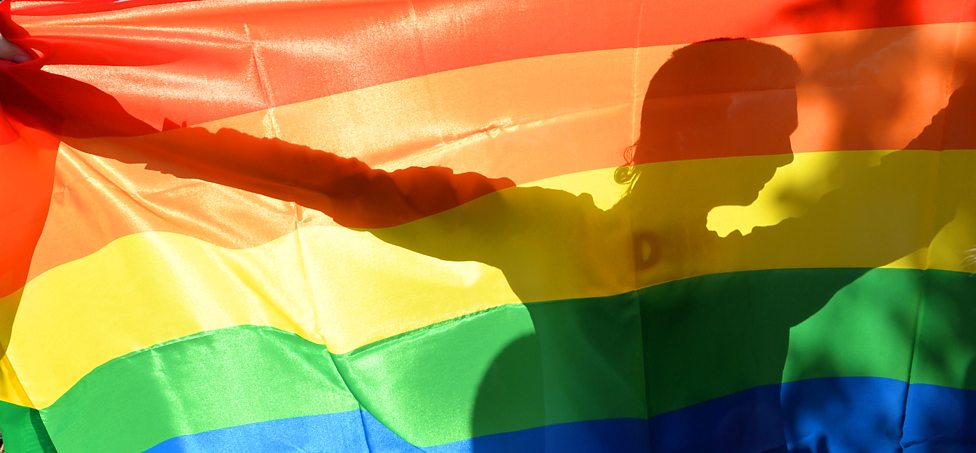
"In Chechnya, I had no choice but to lie or die," says the 20-year-old.
He is now hiding out in a small house on the edge of Moscow with five other Chechen men after they escaped what they say is a brutal campaign against gay men by authorities in the region of Russia's North Caucasus.
Canada reduces waiting period for gay men to donate blood
All refused to give their real names for fear of someone recognising them and tracking them down.
"If any of my relatives realises I'm gay, they won't hesitate a minute before killing me," another of the men, 28-year-old Nortcho said.
"And if they don't do it, they will get killed themselves for failing to uphold the family honour."
While casual homophobia is common in Russia, the problem is particularly acute in Chechnya, where homosexuality is taboo and seen in many families as a moral failing that should be punished by death.
In late March, the Novaya Gazeta liberal newspaper - known for critical reports on Ramzan Kadyrov, Chechnya's iron-fisted ruler for the last decade - published a shocking report that gay men had been rounded up.
The newspaper reported that the authorities had detained more than 100 gay men and urged their families to kill them to "wash clean their honour." It said at least two had been killed by relatives and a third died after being tortured.
The accusations were taken all the more seriously since the security forces controlled by Kadyrov - a fierce loyalist of President Vladimir Putin - have long been accused by rights activists of carrying out kidnappings and beatings of his opponents.
Asked to comment on the Novaya Gazeta report, Kadyrov's spokesman claimed that such punitive treatment of gay men in Chechnya was impossible since they "do not exist" in the region.
Kadyrov on Wednesday denied that any homosexuals had been arrested, saying "provocative articles about Chechnya (have) reported so-called arrests.
UN drops gay rights from tribute to Ban
"It's even embarrassing to talk about it. It's said there have been what are called arrests, murders, (newspapers) have even given the name" of one victim, he said. "But he is alive, in good health and is at home."
The Moscow branch of a Russian NGO called the LGBT Network is helping Chechens to flee the region and receives "three or four requests for help each day," said the branch's leader Olga Baranova. Nearly 20 people at risk have already moved to Moscow, she said.
While Ilya is now more than 1,800 kilometres (1,120 miles) from the Chechen capital of Grozny, he still jumps up every time a car drives close by the house, which is surrounded by a fence.
"By helping me, the Network has handed me a reprieve - but they'll find me in the end," he says quietly.
In October he was taken into a field and beaten by three men in military uniform. A huge scar runs along the side of his jaw.
"They filmed everything. They told me it would end up on social media unless I paid 200,000 rubles ($3,650). I borrowed the money and paid it," he said, speaking hoarsely.
But after that he had to flee to Moscow anyway.
"Some soldiers came to see my mother and told her I was gay," he said. "I'm terrified. I haven't been able to sleep since I left."
Another man who refused even to give an alias said he left Chechnya two weeks ago. He said he too has been unable to sleep since, haunted by the fear that his wife and his child will find out he is gay.
In March he was held "in an unofficial prison" for a week, the man said.
"There were other gay men in the cell. Some of them had been beaten up," he recalled. "When I was released, I realised that meant I should leave as swiftly as possible."
Reports of the abuses have drawn international condemnation, as activists have accused the authorities in Russia of turning a blind eye for fear of upsetting Kadyrov in a region where Moscow fought two bloody separatist wars.
Gilbert Baker, inventor of gay rights rainbow flag, dies at 65
US Ambassador to the United Nations Nikki Haley said Monday she was "disturbed" by the reports.
Tanya Lokshina of Human Rights Watch said that in her view, "It will only take a call from the Kremlin to Kadyrov for the arrests to stop."
Russia's Prosecutor-General's office formally opened an investigation on Monday but Russia's human rights ombudswoman Tatyana Moskalkova told TASS state news agency there had been no reports of such missing people to police, investigators or prosecutors.
Lokshina of Human Rights Watch countered that "imagining people coming forward with information without getting any effective protection, any security guarantee, is just impossible."
"Here we are dealing with LGBT people and they are particularly vulnerable in Chechnya because in addition to fearing the authorities they also have to fear their own relatives," she said.
The Novaya Gazeta reporter Irina Gordiyenko, one of the journalists who broke the story, has received a death threat from Chechnya's chief mufti over her investigation.
Gordiyenko says that Kadyrov rules with "absolute tyranny" with the Kremlin's tacit consent.
"That's what lies at the heart of the problem: the impunity of the Chechen authorities," she said.

1725030039-0/Untitled-design-(2)1725030039-0-165x106.webp)
1725366721-0/kyle-(1)1725366721-0-165x106.webp)
1731410017-0/BeFunky-collage-(45)1731410017-0-165x106.webp)


1732707402-0/Untitled-design-(8)1732707402-0-270x192.webp)










COMMENTS (1)
Comments are moderated and generally will be posted if they are on-topic and not abusive.
For more information, please see our Comments FAQ